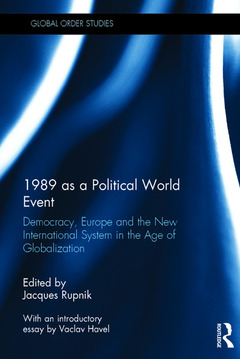Description
1989 as a Political World Event
Democracy, Europe and the New International System in the Age of Globalization
Routledge Series on Global Order Studies Series
Coordinator: Rupnik Jacques
Language: English
Subject for 1989 as a Political World Event:
Keywords
European Politics; Political significance of 1989; Vaclav Havel; Soviet bloc; non-EU NATO Member; West Germany; EU Eastern Enlargement; Gdp Growth; International Monetary Fund; CCP; Gorbachev; Mikhail Gorbachev; UN; Civil Society; Shock Therapy; East Central Europe; Pierre Hassner; Zhao Ziyang; Cee Economy; Post-socialist Capitalism; International Democracy Support; Post-communist Civil Societies; CCP’s Fourteenth Congress; Democracy Promotion; EU’s Transformative Power; EU’s Neighbourhood Policy; Democracy Support; Civil Society Transformations; Iranian Army
Publication date: 09-2013
Support: Print on demand
Publication date: 06-2015
· 15.6x23.4 cm · Paperback
Description
/li>Contents
/li>Readership
/li>Biography
/li>
This book is not about the events of 1989, but about 1989 as a world event. Starting with the fall of the Berlin Wall and the collapse of the Soviet bloc it examines the historical significance and the world brought about by 1989.
When the Cold War ended in Europe it ushered in a world in which the international agenda is set outside Europe, in America or Asia. The book critically examines and moves beyond some of the conveniently simple paradigms proposed in the nineties, by leading political scientists such as Fukuyama and Huntington, to show how the events of 1989 meant different things to different parties. This was an anti-utopian revolution, a symbol of the possibility of non-violent transitions to democracy, which raised the hopes of world-wide democratic changes. Contributors show how 1989 can be seen as the founding moment of a globalized world, but equal attention should be given to the dispersion of its meanings and the exhaustion of some of its main trends associated with the post-1989 era. Europe was reunited, yet it is in crisis. Twenty years on, global markets have brought about a global financial crisis. The fall of the Berlin Wall was celebrated as the advent of free movement in a world without borders. Now however, we can see that new borders, walls, fences have since been built.
With an introductory essay by Vaclav Havel, 1989 as a Political World Event will be of interest to scholars of European Politics and International Relations.
Foreword On the Unpredictability of History Václav HavelPart I: The meanings and Legacies of 1989 1. Introduction: The World After 1989 and the Exhaustion of Three Cycles Jacques Rupnik 2. Writing 1989: A World Narrative Karoline Postel-Vinay 3. 1989: A Philosophy of Immediacy Zaki Laïdi Part II: Re-inventing Democracy and its Discontents 4. Democracy and its Dissatisfaction Ivan Krastev 5. From the Revolutions of 1989 to Democracy Fatigue in Eastern Europe Jacques Rupnik 6. The Difficult New Era for International Democracy Support Thomas Carothers 7. Civil Society: from Myth to Reality Grzegorz Ekiert 8. ‘Tropical Democracy’? Transplantating of Pluralism into Africa Richard Banégas 9. Arab Spring and Middle Eastern Exceptionalism Dominique Moïsi Part III: Varieties of Capitalism in the Age of Globalization 10. Institutional Change and Economic Transformation after Socialism Leszek Balcerowicz 11. The Political Economy of post 1989 Capitalism in East-Central Europe Claus Offe 12. 1989 and the Advent of an Authoritarian State Capitalism in China Jean-François Huchet Part IV: Between Global Governance and New Power Rivalries 13. American Visions of the World after 1989 John L. Harper 14. Russia and the Quest for Lost Power Marie Mendras 15. China and the End of Socialism in Europe: A Godsend for the Chinese Communists Jean-Philippe Béja 16. The UN and the Changing Meaning of an International Community Jean-Marie Guéhenno 17. The Arab four seasons: When an excess of religion leads to political secularization Olivier Roy
Jacques Rupnik is Senior Research Fellow at CERI and Professor at Sciences Po, Paris and the College of Europe in Bruges, Belgium.




